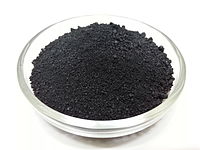
Photo from wikipedia
The great advances in the studies on metal complexes for the treatment of different cancer forms, starting from the pioneering works on platinum derivatives, have fostered an increasingly growing interest… Click to show full abstract
The great advances in the studies on metal complexes for the treatment of different cancer forms, starting from the pioneering works on platinum derivatives, have fostered an increasingly growing interest in their properties and biomedical applications. Among the various metal-containing drugs investigated thus far, ruthenium(III) complexes have emerged for their selective cytotoxic activity in vitro and promising anticancer properties in vivo, also leading to a few candidates in advanced clinical trials. Aiming at addressing the solubility, stability and cellular uptake issues of low molecular weight Ru(III)-based compounds, some research groups have proposed the development of suitable drug delivery systems (e.g., taking advantage of nanoparticles, liposomes, etc.) able to enhance their activity compared to the naked drugs. This review highlights the unique role of Ru(III) complexes in the current panorama of anticancer agents, with particular emphasis on Ru-containing nanoformulations based on the incorporation of the Ru(III) complexes into suitable nanocarriers in order to enhance their bioavailability and pharmacokinetic properties. Preclinical evaluation of these nanoaggregates is discussed with a special focus on the investigation of their mechanism of action at a molecular level, highlighting their pharmacological potential in tumour disease models and value for biomedical applications.
Journal Title: Pharmaceuticals
Year Published: 2019
Link to full text (if available)
Share on Social Media: Sign Up to like & get
recommendations!